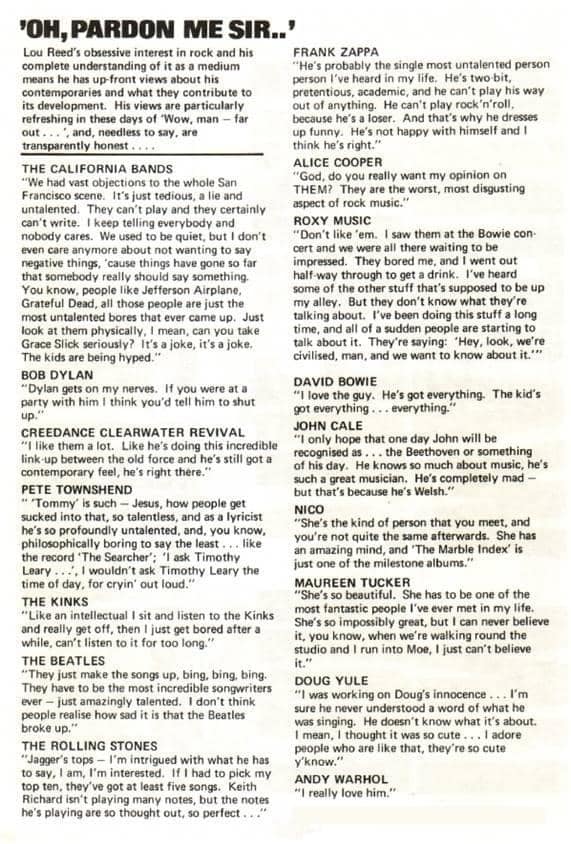
A signal characteristic of powerful criticism is that it keeps people talking years after the death of the critic himself. Think, for example, of Lester Bangs, who despite having been gone for nearly 40 years left behind judgments that still resonate through the halls of rock and roll. The vitality of his work wasn’t hurt by a tendency to get unusually close to some of his subjects, especially Lou Reed. “The things he wrote and sang and played in the Velvet Underground were for me part of the beginning of a real revolution in the whole scheme between men and women, men and men, women and women, humans and humans,” Bangs wrote in 1980.
Five years earlier, Bangs had called Reed “a completely depraved pervert and pathetic death dwarf,” as well as “a liar, a wasted talent, an artist continually in flux, and a huckster selling pounds of his own flesh. A panderer living off the dumbbell nihilism of a seventies generation that doesn’t have the energy to commit suicide.”
All this he meant, of course, in praise. Reed, for his part, displayed such elaborate disdain for Bangs that it could only have been motivated by respect. “What other rock artist would put up with an interview by the author of this article,” Bangs rhetorically asked, “read the resultant vicious vitriol-spew with approval, and then invite me back for a second round because of course he’s such a masochist he loved the hatchet in his back?”
A magazine page now circulating on Twitter collects Reed’s own opinions on a variety of other rock acts and countercultural figures of the 1960s and 70s. The Beatles, who’d just broken up? “The most incredible songwriters ever” (though Reed’s judgment of the Fab Four would change with time). The Rolling Stones? “If I had to pick my top ten, they’ve got at least five songs.” Creedence Clearwater Revival? “I like them a lot.” David Bowie? “The kid’s got everything… everything.” Fellow Velvets Doug Yule (“so cute”), Nico (“the kind of person that you meet, and you’re not quite the same afterwards”), and John Cale (“the next Beethoven or something”) get compliments; as for Andy Warhol, out of whose “factory” the band emerged, “I really love him.” (“Lou learned a lot from Andy,” wrote Bangs, “mainly about becoming a successful public personality by selling your own private quirks to an audience greedy for more and more geeks.”)
But as a connoisseur of the hatchet, Reed also plants a few himself. Of “California bands” like Jefferson Airplane and the Grateful Dead, he said “they can’t play and they certainly can’t write.” Nor, evidently, could the Who’s Pete Townshend: “as a lyricist he’s so profoundly untalented and, you know, philosophically boring to say the least.” Reed does “get off” on the Kinks, “then I just get bored after a while.” Alice Cooper represents “the worst, most disgusting aspect of rock music”; Roxy Music “don’t know what they’re talking about.” Frank Zappa is “the single most untalented person I’ve heard in my life. He’s two-bit, pretentious, academic, and he can’t play his way out of anything.” Yet at Zappa’s posthumous induction into the Rock and Roll Hall of Fame in 1995, the laudatory speech was delivered by none other than… Lou Reed. In rock, as in the other arts, resentment can become the seed of admiration.
Related Content:
Lou Reed Creates a List of the 10 Best Records of All Time
Hear Ornette Coleman Collaborate with Lou Reed, Which Lou Called “One of My Greatest Moments”
Based in Seoul, Colin Marshall writes and broadcasts on cities and culture. His projects include the book The Stateless City: a Walk through 21st-Century Los Angeles and the video series The City in Cinema. Follow him on Twitter at @colinmarshall or on Facebook.
Lou Reed Turns Rock Critic, Sizing Up Everyone from the “Amazingly Talented” Beatles to the “Two Bit, Pretentious” Frank Zappa is a post from: Open Culture. Follow us on Facebook and Twitter, or get our Daily Email. And don't miss our big collections of Free Online Courses, Free Online Movies, Free eBooks, Free Audio Books, Free Foreign Language Lessons, and MOOCs.
0 Commentaires